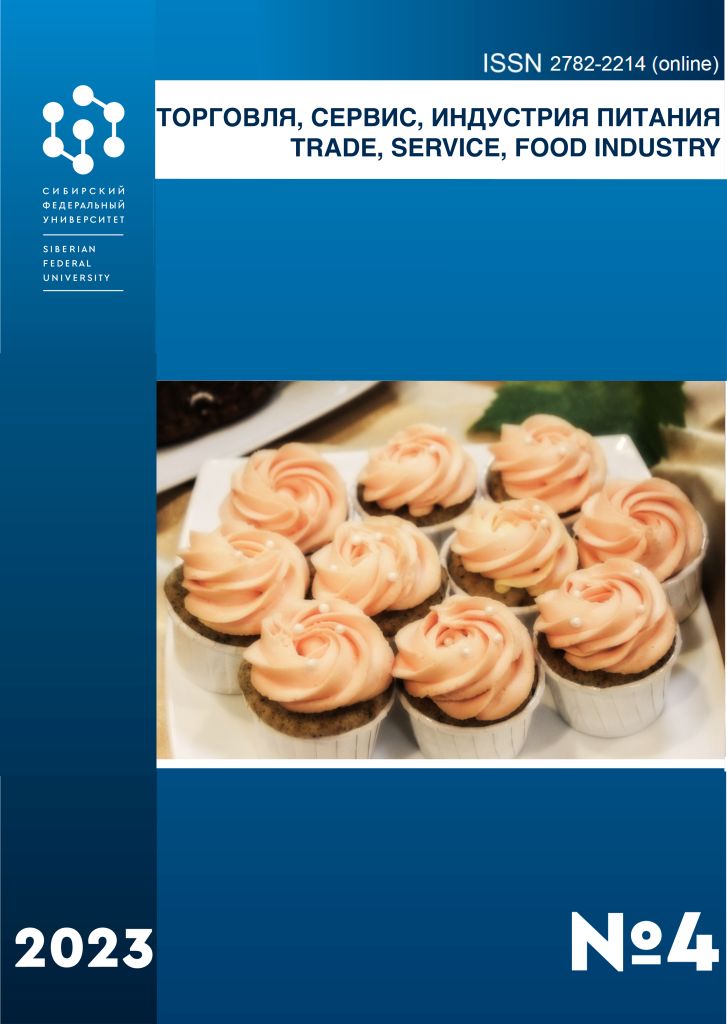from 01.01.2021 until now
Krasnoyarsk, Krasnoyarsk, Russian Federation
from 01.01.2002 until now
Krasnoyarsk, Krasnoyarsk, Russian Federation
from 01.01.2021 until now
Krasnoyarsk, Krasnoyarsk, Russian Federation
from 01.01.2021 until now
Krasnoyarsk, Krasnoyarsk, Russian Federation
UDC 339.137
CSCSTI 06.00
The article examines various aspects of digitalization, such as the use of online platforms and online stores, automation of processes using artificial intelligence and robotics, data analytics and personalization of offers for customers. This article examines the concept of "competitiveness" and defines its main aspects. The article pays attention to such a concept as "digitalization of the economy". Based on the opinions of various authors, it was possible to identify the positive and negative features of digitalization. However, the complexity of implementing digital technologies is due to the emergence of possible challenges and problems that trade organizations may face when implementing digital technologies, such as the need for internal restructuring of the organization, ensuring data security and customer confidentiality, as well as the need for constant updating and development of technological infrastructure. This article provides an overview of the impact of digitalization on the competitiveness of trade organizations, identifies the advantages and challenges of this process, and emphasizes the importance of a strategic approach and change management for the successful implementation of digital projects. Thus, the article examines the impact of such trends in the digitalization of the economy as the introduction of online sales, self-service cash registers, process automation, digital marketing, and collaboration.
competitiveness, digitalization, digital technologies, trade, competitive advantages
1. Abayeva, N. P., Starostina, T. G. (2018). Competitiveness of the organization. Ulyanovsk : UlSTU, 259.
2. Alexandrov, A. K., Kruglik, V. M., Nedelkin, A. N., Savchuk, O. A. (2020). Competitiveness of an enterprise (firm). Minsk : New Knowledge ; Moscow : INFRA-M, 285.
3. Andreeva, A. E. (2017). Multifactorial analysis of enterprise competitiveness. Science and business: ways of development, 3, 25-28.
4. Antonov, G. D., Ivanova, O. P., Tumin, V. M., Kostromin, P. A. (2021). Competitiveness of organizations and territories. Moscow : INFRA-M, 375.
5. Bykov, V. A., Komarov, E. I. (2018). Competitiveness management. Moscow : RIOR Publishing Center; Moscow : INFRA-M, 242.
6. Belousov, Yu. V., Timofeeva, O. I. (2019). Methodology for determining the digital economy. The world of the new economy, 4, 79-89.
7. Belousov, Yu. V. (2021). Digital economy: concept and development trends. Bulletin of the Institute of Economics of the Russian Academy of Sciences, 1, 26-43.
8. Pechnikova, N. S. (2021). Competition in the digital economy: possibilities and limitations. E-Scio, 11. [Electronic source]. URL: https://cyberleninka.ru/article/n/konkurentsiya-v-usloviyah-tsifrovoy-ekonomiki-vozmozhnosti-i-ogranicheniya (Date of access: 05.11.2023).
9. Ozhegov, S. I. (2015). Russian Russian Dictionary: Explanatory dictionary of the Russian language: 100,000 words, terms and expressions [new edition]. Moscow : Mir I obrazovanie, 1375.
10. Fazliahmetov, R. G., Kiperman, G. Ya. (2014). Innovations as a way to increase competitiveness. Creative Economy, Vol. 8, No 3, 58-74.
11. Brylev, A. A., Turchayeva, I. N. (2020). Competitiveness and agricultural insurance. Moscow : INFRA-M, 232.
12. Rubin, Yu. B. (2007). Theory and practice of entrepreneurial competition. Moscow: Market DS, 480.
13. Fatkhutdinov, R. A. (2004). Managing the competitiveness of an organization: exclusive technologies for the formation of a strategy to increase the competitiveness of the organization: theory, methodology, practice. Moscow : EKSMO, 541.
14. Babkin, A. V., Chistyakova, O. V. (2017). Digital economy and its impact on the competitiveness of entrepreneurial structures. Russian Entrepreneurship, Vol. 18, No 24, 4087-4102.
15. Bagautdinova, N. G., Nikulin, R. A. (2017). Basis of competitiveness of an enterprise under conditions of asymmetric information in knowledge-based economy. Kazan economic bulletin, 1(27), 30-35.
16. Churaeva, A. V. (2021). Review of theoretical approaches to determining the competitiveness of a firm. Trade, service, food industry, Vol. 1, No 1, 94-103. DOI:https://doi.org/10.17516/2782-2214-0009.
17. On average, Russian users spend 3 hours and 40 minutes a day on the Internet. Timeweb Community News. [Electronic source]. URL: https://timeweb.com/ru/community/articles/mediascope-v-srednem-polzovateli-rf-provodyat-v-internete-3-chasa-40-minut-v-den (Date of access: 11.12.2023).
18. Research: 46% of Russians do not go to the shops and make all purchases on the Internet. Gazeta.Ru. [Electronic source]. URL: https://www.gazeta.ru/social/news/2022/06/28/18018146.shtml?updated (Date of access: 11.12.2023).
19. Petrova, L. A., Kuznetsova, I. E. (2020). Digital technologies in economics and business. STAGE, 2, 74-89.
20. Self-Checkout System Market to cross $10 Bn by 2030. [Electronic source]. URL: https://www.gminsights.com/pressrelease/self-checkout-system-market (Date of access: 11.12.2023).
21. Platunina, G. P., Ermolenko, D. S. (2021). Trends in the development of the digital economy. Economics and quality of communication systems, 1, 13-17.
22. Musalnikov, D. A. (2019). Competitiveness of the enterprise. Factors, ways of increasing competitiveness. Issues of science and education, 1, 4-8.
23. Svalova, Yu. A., Konnov, G. N. (2020). On the development of competition in Russia in the digital economy. Russian Competition law and Economics, 3(23), 36-43.
24. Sklyar, M. A., Kudryavtseva K. V. (2019). Digitalization: main directions, advantages and risks. The economic revival of Russia, 3(61), 103-114.









